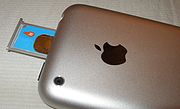
The original iPhone’s SIM card slot shown as open, with ejected SIM card. The SIM card is located in a slot at the top of the device, which can be ejected with a paperclip or a SIM card ejection tool which is included with the iPhone 3G. In most countries, the iPhone is usually sold with a Sim lock preventing the use of SIM cards from different mobile networks.
Storage
The iPhone was initially released with two options for internal storage size; either a 4 GB or 8 GB flash drive (manufactured by Samsung) model was available. On September 5, 2007, Apple announced they were discontinuing the 4 GB models. On February 5, 2008, Apple announced the addition of a 16 GB model to the iPhone lineup. The iPhone does not contain any memory card slots for expanded storage.
Included items and accessories
Both the iPhone and the iPhone 3G came with a series of included accessories and items when purchased.
- Documentation
- Stereo headset with microphone
- Dock connector to USB cable (standard USB cable for connection)
- Cleaning/polishing cloth
- Dock
- Standard USB power adapter
iPhone 3G
- SIM ejector tool
- Mini USB power adapter (North America)
- Standard USB power adapter (Everywhere except North America)
SIM Lock Removal
While initially iPhones were only sold on the AT&T network with a SIM lock in place, various hackers have found methods to "unlock" the phone; more recently some carriers have started to sell unlocked iPhones. More than a quarter of iPhones sold in the United States were not registered with AT&T. Apple speculates that they were likely shipped overseas and unlocked. AT&T has stated that the " iPhone cannot be unlocked, even if you are out of contract".
Unlocked iPhone firmware version 2.0 using GrameenPhone Network in Bangladesh
On November 21, 2007, T-Mobile in Germany announced it would sell the phone unlocked and without a T-Mobile contract, caused by a preliminary injunction against T-Mobile put in place by their competitor, Vodafone. In Germany, a company is not allowed to lock the SIM card to itself. On December 4, 2007, a German court decided to grant T-Mobile exclusive rights to sell the iPhone with SIM lock, overturning the temporary injunction. In addition, T-Mobile will voluntarily offer to unlock customers' iPhone after the termination of the contract.
On carriers where removal of the iPhone’s SIM lock is allowed the carrier can submit a request to Apple which will then remove the carrier locking on the next restore of the iPhone through iTunes. Customers of the carriers Optus and Vodafone in Australia, and Netcom in Norway, have so far been successful in unlocking their phones to work on any network.

